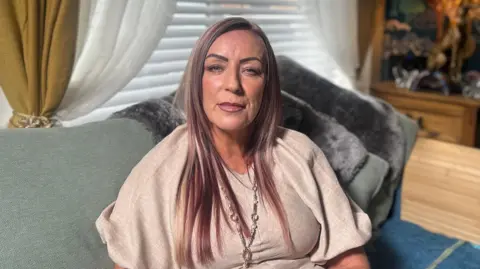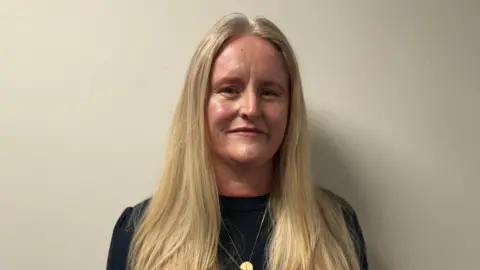Victims want their voices to be heard in court
 BBC
BBCCampaigners for victims of crime in Northern Ireland want to see urgent changes to how victim impact statements are handled in court.
Northern Ireland and Scotland are the only parts of the UK and Ireland where victims do not have the right to read their own statements in court.
However, in a case in Newry in March, the foster mother of a child left profoundly disabled after an assault was permitted to read her own statement to the court - believed to be a legal first for Northern Ireland.
Julieanne Boyle, who was raped by her father as a teenager, and finally saw justice 30 years later, did not get the opportunity to address the court in her case and wants to see change for other victims.
During courting hearings in Northern Ireland, victims are not routinely given the chance to speak about how a crime has affected them.
But documents, known as Victim Personal Statements (VPS), can be submitted to a judge after a defendant has been found guilty.
These can help judges make informed decisions on sentencing.
Rape victim says she 'wasn't being heard'
Ms Boyle said she is angry she did not get the chance to speak in court and that the VPS would have given her a voice.
"With that victim impact statement that was the most important thing for me - to be allowed to have my voice, to be allowed to say what he had done to me, how he had destroyed my life.
"I wasn't being listening to, and I wasn't being heard. There's no closure for me, I'm still in that courtroom, waiting," Ms Boyle said.
"It would have been a bit of empowerment for me to be able to say to him: 'You raped me. You were meant to protect me, but you didn't protect me, you raped me'.
"Victims are crying out and have been for a very long time to be able to read these statements, for us to be heard.
"Let the victims read their statements, it's going to be the most powerful thing."
'Discretion of the judge'
In a statement to the BBC, the Lady Chief Justice's office said: "The opportunity to have the statement read out in court is not currently mandatory in Northern Ireland, and the legislation does not prescribe the manner in which a VPS may be read in court or by whom."
The office added: "Any decision for a victim to read their statement in court would be at the discretion of the judge."
In a separate statement the Department of Justice said Justice Minister Naomi Long is "supportive of measures which can help victims on their journey to recovery, such as allowing victims to read a VPS in court".
The department added it has "convened a working group to consider changes" but added that such a scheme "would require judicial consideration on a case-by-case basis".
'Victims feel they're being silenced'

The interim Victims of Crime Commissioner, Geraldine Hanna, said there is a cathartic release for victims of crime when they are given the opportunity to address the court themselves.
"Victims feel that they're being silenced, they've put a lot of effort, thought and energy into writing their statement, and they want to read it out," she said.
"They want to tell the judge and the court the impact it's had, and for many, they want to tell the offender the impact that this has had on them. So not being given that opportunity removes that.
"The fact that we've seen this happen in a case means that I'm not sure that we necessarily need new legislation.
"I think the legislation might help put the belt and braces on, but in the interim, from now, I want to see it consistently being offered.
"If we can do it in one case then, I would question why we can't be offered it now."
Many high-profile cases in other parts of the UK have featured the use of these statements, including the trial of Kyle Clifford, who murdered his ex girlfriend with a crossbow, also killing her mother and sister.
Father and husband John Hunt read his statement at Clifford's sentencing for the triple murder, reducing a packed courtroom to tears.
